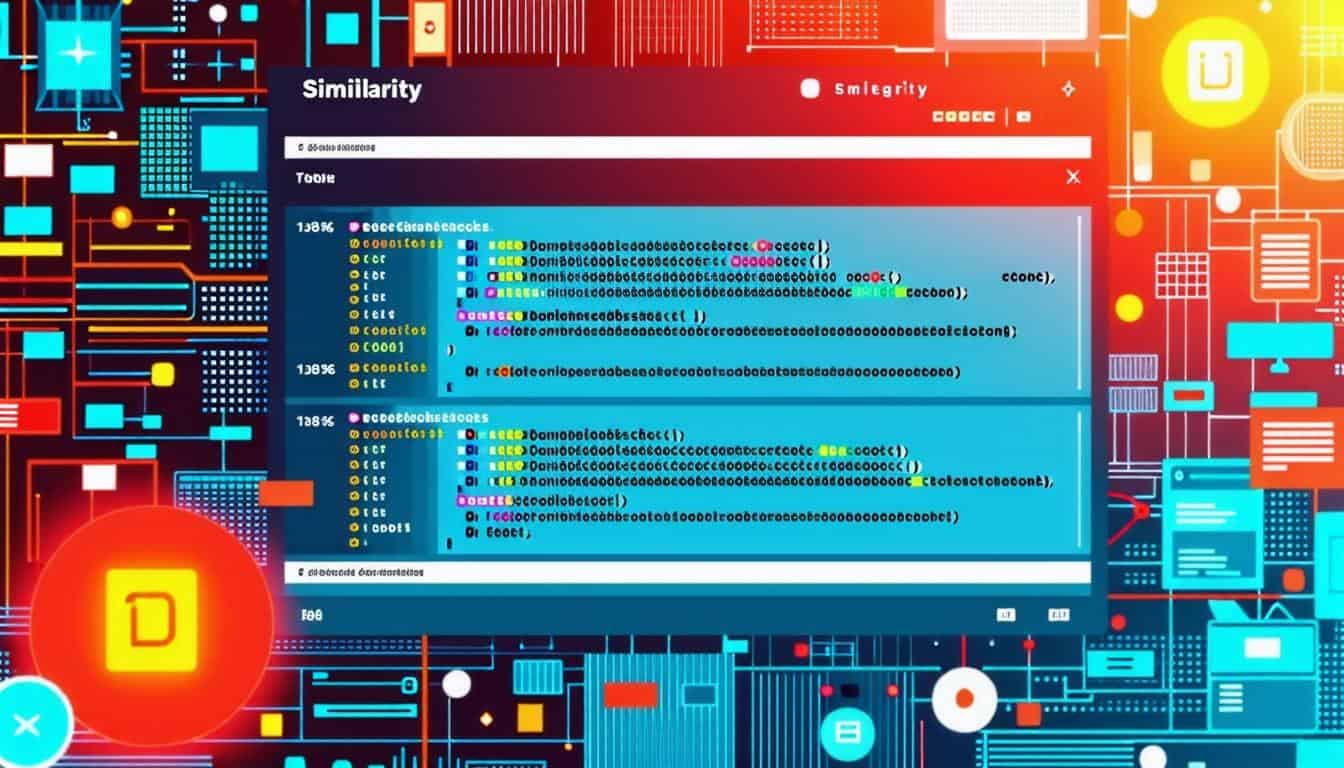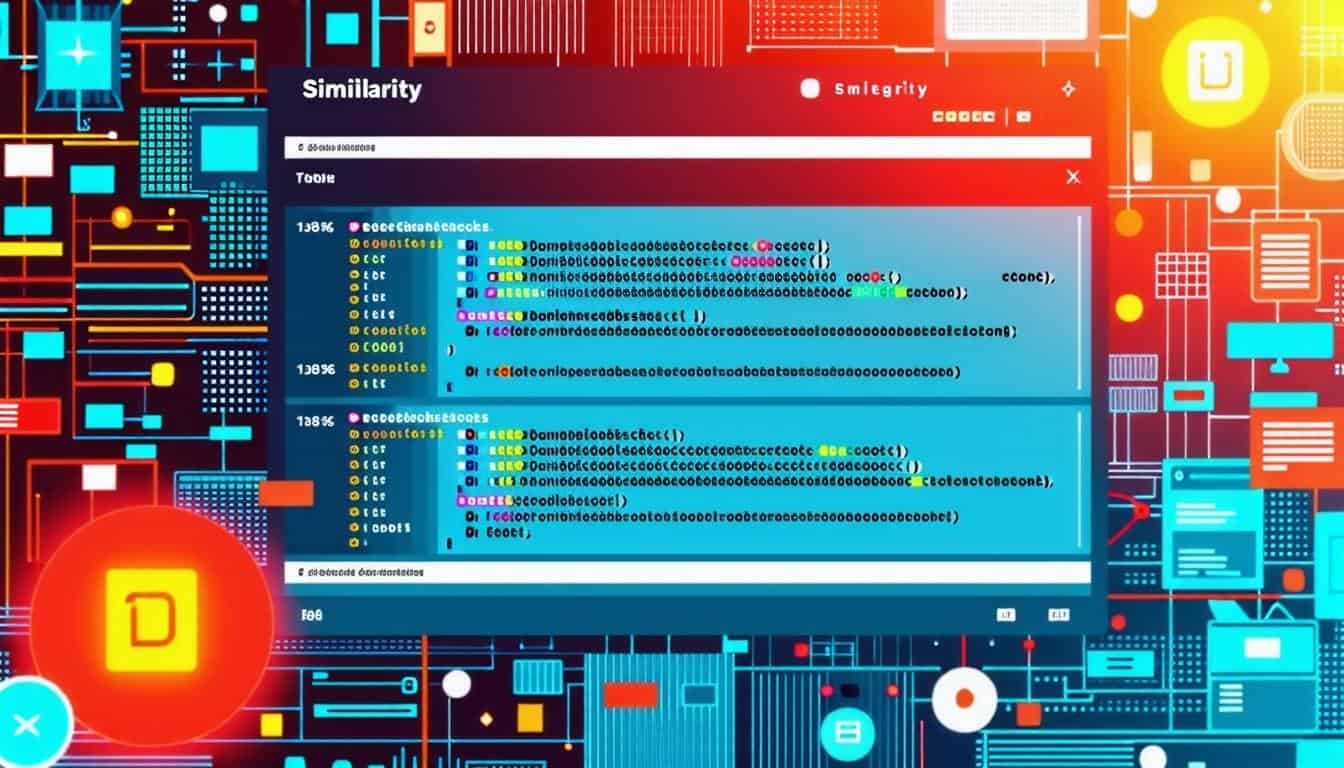Zybooks is an innovative educational platform designed to improve student learning through engaging, interactive activities. To promote academic integrity, Zybooks employs advanced tools like the Similarity Checker, which identifies similarities in code submissions among students. This feature empowers teachers to detect instances of copying, ensuring originality in student work.
Also, Zybooks carefully tracks the time students dedicate to their assignments. This valuable data provides educators with insights into student engagement and effort, revealing whether learners are genuinely invested in their education. By implementing these strategies, Zybooks fosters a fair and transparent learning environment for all.
Key Takeaways
- Zybooks features a built-in similarity checker that swiftly identifies copied code submissions among students.
- Using a “text diff” algorithm, the platform uncovers structural similarities in code, no matter the variable names.
- Instructors can effortlessly track student engagement and scrutinize program submissions for potential cheating with integrated analytical tools.
- Zybooks has implemented advanced features to spot common style anomalies in code produced by AI tools like ChatGPT.
Similarity Checker for Program Submissions

The Similarity Checker in Zybooks is a critical tool for upholding academic integrity. It swiftly identifies similar program submissions among students, much like a detective analyzing fingerprints. Powered by MOSS, this feature flags suspicious similarities, enabling instructors to detect potential plagiarism with ease.
Picture a classroom where each student’s work is as unique as snowflakes. The Similarity Checker acts like a magnifying glass, revealing whether two supposed snowflakes are truly identical. This tool not only highlights similarities but also generates detailed reports, allowing instructors to track coding practices over time and uncover hidden patterns in student submissions.
Also, Zybooks is committed to preventing cheating through continuous system updates. It logs submission timestamps and tracks coding trails, providing instructors with insights into students’ genuine efforts. This complete approach is critical for fostering a culture of honesty and learning.
For deeper insights into cheating detection, explore this research item.
User Activity Tracking and Engagement Monitoring
At Zybooks, we use user activity tracking and engagement monitoring to maintain academic integrity. Imagine it as a security camera in a store, capturing every move. Our similarity checker acts like a detective, scrutinizing submissions for closely matched content, ensuring students’ work is original and not borrowed from others.
Instructors can track time spent on assignments, providing insights into students’ genuine effort—much like monitoring study hours before a big test. We also employ a discreet method to identify students who share problems online, protecting against academic dishonesty. By understanding the motivations behind cheating, we can develop more effective prevention strategies. For deeper insights, explore our detection guide.
Algorithmic Monitoring of Code Structure and Style Anomalies
At zyBooks, we harness the power of algorithmic monitoring to uncover code structure and style anomalies in student submissions. Think of it as a detective examining fingerprints; our tools carefully analyze code to reveal patterns that may indicate cheating. For example, the MOSS algorithm acts like a spotlight, illuminating similarities between submissions, much like identifying identical twins in a busy crowd.
Our APEX tool zeroes in on style inconsistencies typical of AI-generated code, such as that produced by ChatGPT. By focusing on code structure—disregarding variable names and minor logic tweaks—we can detect discrepancies that hint at academic dishonesty. This approach not only upholds academic integrity but also nurtures authentic learning experiences.
With these state-of-the-art techniques, we empower instructors to cultivate a fair learning environment, encouraging students to engage sincerely with their coding assignments.
Automated Grading and Real-Time Feedback Mechanisms
Automated grading and real-time feedback mechanisms are transforming student assessment. Imagine this: your school work is graded instantly, much like scoring points in a video game. This is the reality with platforms like zyBooks, which use advanced algorithms to evaluate code submissions and identify style anomalies that may signal cheating, particularly from AI tools like ChatGPT.
So, how does it work?
The zyBooks similarity checker acts like a detective analyzing fingerprints, comparing student submissions to uncover similarities. This helps instructors detect potential cheating. Also, zyBooks monitors the time spent on assignments, distinguishing between genuine effort and shortcuts. This complete approach not only identifies dishonesty but also cultivates a culture of academic integrity, encouraging students to engage deeply with their learning.
Adaptive Learning and Unique Problem Generation
Adaptive learning acts as your personal tutor, customizing educational experiences to fit your unique learning style and pace. In Zybooks, this manifests through unique problem generation—challenges that evolve based on your previous answers, ensuring you’re consistently engaged and appropriately challenged.
How does this connect to cheating detection? Zybooks utilizes a similarity checker to spot patterns in submitted code, much like a detective assembling clues. When multiple students submit similar solutions, it triggers a warning. Plus, the coding trail feature records each student’s programming journey, promoting honesty by making their efforts transparent. This system not only upholds academic integrity but also boosts student engagement through tailored learning experiences.
Confidential Methods for Identifying Plagiarism Sources
At Zybooks, we use a variety of confidential methods to detect plagiarism and uphold academic integrity. Our Similarity Checker functions like Stanford’s MOSS program, identifying similarities in student submissions by analyzing code structures. This approach emphasizes functionality over variable names, making it more challenging for students to cheat.
Instructors can easily access this built-in similarity checker to uncover copied solutions. We also maintain a coding trail, which records student programming activities, deterring dishonest behavior. By exploring the motivations behind cheating, we can develop targeted strategies to combat it, fostering a more honest learning atmosphere.
With ongoing updates and a commitment to preventive measures, we strive to cultivate authentic learning experiences while reducing the allure of cheating.
Preventive Measures to Reduce Cheating Temptations
To effectively reduce cheating temptations, we must take a proactive stance. Imagine constructing a dam to hold back floodwaters; we need to build barriers that deter dishonesty. Here are necessary strategies:
- Auto-generated Challenges: Providing unique problems for each student ensures that no two submissions are identical, remarkably minimizing the chance of copying.
- Scaffolding: Gradual learning activities allow students to master concepts step-by-step, reducing the overwhelm that can lead to cheating.
- Collaborative Learning: Pair programming encourages teamwork and deeper understanding, making cheating less attractive.
- Clear Communication: Offering timely and precise instructions empowers students to tackle tasks with confidence, lowering the temptation to cheat.
By prioritizing prevention over detection, we create an environment where integrity flourishes, much like nurturing a garden to cultivate dynamic plants.
Summing up
Zybooks employs innovative strategies to combat cheating and encourage authentic learning. By designing individualized challenges, they remarkably diminish the likelihood of copying. Tools such as coding trails and similarity checkers provide instructors with clear insights into each student’s genuine efforts. Why do students cheat?
Understanding this question is critical for effective prevention. With these resources, we cultivate a supportive learning atmosphere, empowering students to thrive independently.
Frequently Asked Questions
What can instructors see on zyBooks?
Instructors can see student progress, completion rates, and unique responses to challenge activities on zyBooks.
What methods does Zybooks use to identify academic dishonesty?
Zybooks uses unique problem generation, coding trails, and similarity checks to identify and deter academic dishonesty effectively.
How does the zyBooks similarity checker work?
The zyBooks similarity checker analyzes code structure and logic, focusing on functionality rather than variable names to detect similarities.
Can zyBooks detect ChatGPT?
Zybooks doesn’t directly detect ChatGPT usage, but it employs unique problem generation and coding trails to discourage cheating.

